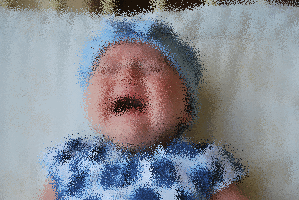More News on Baby Colic and Migraine
It’s news, but it mostly isn’t news. A new study published in the journal Headache confirms again that there’s a link between colic in babies and migraine.

Let’s take a quick look at the study, and then talk about how to apply the information.
The study, published last month, set out to investigate if parents with migraine were more likely to have babies with colic. Colic, as you may know, is defined as prolonged and intense crying/fussiness, and it tends to peak in the second month before decreasing in the 3rd or 4th month (read more about colic here).
The study confirmed that mothers with migraine are more likely to have colicky babies. And if migraine was chronic, it was even more likely.
Unlike some information we’ve seen before, there was no link between fathers with migraine, only mothers.
(On the other hands, although the link between mothers with anxiety and colicky babies was weak, a father with anxiety or depression was more likely to have a colicky baby).
As the study of this link continues, there are two important applications.
First, once again, colic is a sign that parent should watch for migraine as their child grows. Catching migraine early can avoid a multitude of problems down the road. (And we already know that colic significantly increases risk of migraine – it’s a major warning sign.)
Second, it may be wise for doctors to warn mothers that colic may be coming, and counsel them about how to deal with it. It’s a lot easier if it’s not a complete surprise.
For more on migraine and colic, see Could we Stop Migraine – At the Start of Life?.
Read the study abstract here: The Association Between Parental Migraine and Infant Colic: A Cross-Sectional, Web-Based, U.S. Survey Study.
